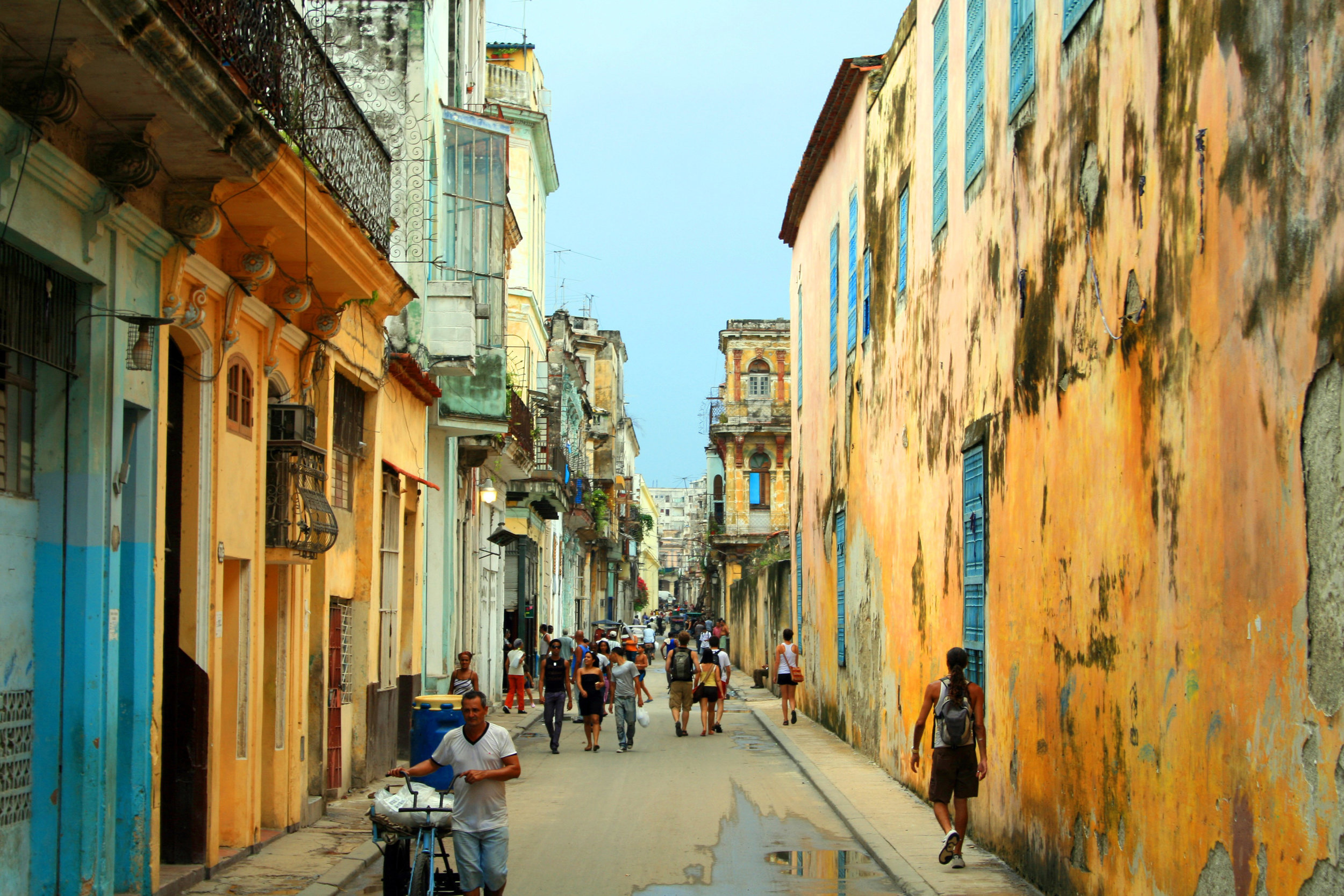Think Twice Before "Havana Good Time" In Cuba (And Read This, Please!)
Retro cars, mimosas, and a tropical vacation less than 500 miles off the coast of the US?
There’s a reason that Cuba has risen as the hot spot for tourism the past few years. Last year, with a team of cameramen in tow, even the Kardashian sisters took a trip to Cuba. The next four days saw the group cruising through Havana in a hot pink vintage Chevrolet, taking selfies, dining out, and fawning over the retro charm of the city.
But there’s a lot that’s problematic about the Kardashian-Cuba trip. For example, Kim’s insta caption that read: “Being away and living in the moment having no phone service was so amazing! We felt like we stepped back into a different time period.” Because while having no phone service is fun for a week, for the Cuban people, it’s their life. And while the retro buildings and cars are fun for some photos, they’re the result of an oppressive regime that has held the country back from economic advancement, decent living standards, the most basic human freedoms.
The Kardashians initially went to Havana to attend Karl Largerfeld’s star-studded Chanel show. After all, the colorful nostalgia and cultural richness provided a unique backdrop. But the locals were barred from attending; the Cuban government prevents them from even having prolonged interactions with tourists.
Cuban tourism raises a lot of problems. First off, due to the socialist structure of the Cuban economy, most tourism money goes straight to the authoritarian government. Those guided tours, shiny vintage cars, four-course dinners at "top-rated restaurants", and highly overpriced hotel rooms you find online? All of those businesses are operated by, or linked to the Cuban government. Not only will your dollars support an oppressive, violent regime, but the authenticity of your experience will surely be compromised.
Photo courtesy of @ansalmo_juvaga
Though the country's GDP may be increasing from the influx of tourist funds, the locals' quality of life remains the same—or even worse. Thanks to the trade embargo, Cubans have come to depend solely on resources from the island. Tourists’ consumption cuts into the limited resources of local Cubans, who use un Libreto de Abastecimiento, or ration cards, to buy supplies. Even simple items, like toilet paper, are often scarce and hard to get a hold of. Food that is usually a staple of the Cuban diet – like onions and peppers – is now a luxury and food that was once a luxury – like pork – is simply unheard of. Before leaving on your vacation to Havana, there’s a lot to consider.
However, there is hope, and much to gain from a trip to Cuba. Travelers have the opportunity to share perspectives with Cuba's local people, become humbled by learning its tragic history, pay respects to its once-vibrant culture, and provide resources to its communities. If done carefully, this doesn't have to be at the local's expense. (And the tourist economy does have potential to help boost their economy in the long run.) If you want to travel to Cuba and know what you're looking to gain and learn from the experience, follow these guidelines to make sure you're traveling responsibly:
1. Stay in a Casa Particular.
While all of Cuba’s official hotels are state-run, they are not your only option. Due to the massive boom of tourism, hotels have not been able to accommodate all the visitors. To remedy this, the government began issuing licenses for locals to run Airbnb-ish accommodations out of their own homes. Not only are Casa Particulars cheaper and more authentic than a hotel, but they directly benefit the people of Cuba. Casa Particulars often offer not only breakfast and coffee, but an opportunity to get to know the locals.
2. Pay drivers in cash, and offer tips.
The average salary in Cuba is $20 a month. However, a cab ride from the Havana airport can cost as much as $25. For this reason, driving a taxi is a highly coveted job and one normally given to highly trained individuals. Pay the drivers in cash to avoid problems, and offer tips (-- highly appreciated wherever you go).
3. Scout out privately-owned restaurants.
Beginning in the 1990’s, the Cuban government started handing out private licenses to a select few businesses, mostly restaurants. While these restaurants can normally have very long wait times (a byproduct of the relaxed culture), the food is better than you’ll find at a state-run restaurant. After all, the food has to be phenomenal in order for them to stay competitive.
4. Bring supplies.
Things that we take for granted can be amazing luxuries in Cuba. Toilet paper, tampons, crayons, paintbrushes, etc. Pack an extra bag with a variety of supplies before you go and hand them out to people you meet while there. Definitely leave your Casa Particular host with something, and don’t be afraid to offer supplies to others as well.
5. Don’t buy cigars from state-run stores.
The government takes 90 percent of all the tobacco grown in Cuba and rolls their own cigars to sell at state-run stores in Havana. If you’re out in the country-side, find a small farm shop to buy a cigar from a local. They’ll be fresher, cheaper, and the money will go to support the people.
Photo courtesy of Business Insider
6. Advocate.
Being a tourist carries a lot of privilege. If your host, taxi driver, or friend gets harassed by the police, don’t be afraid to step-in. Otherwise, it’s always a fantastic idea to volunteer, or even just spread the word about the Cuban experience. Post the beautiful picture of the old car, but in the caption, don’t ignore the sociopolitical state of the country. Cuba is a fantastic place of fantastic people – treat it right.
Volterre donates a portion of our profits to Flyte, a foundation that organizes international trips for disadvantaged students. Last year, they sent a group of 12 students to Cuba to learn about the local culture. Learn more at volterre.co/mission.


















We could’ve just said “avoid resorts,” but we decided to go a little deeper.